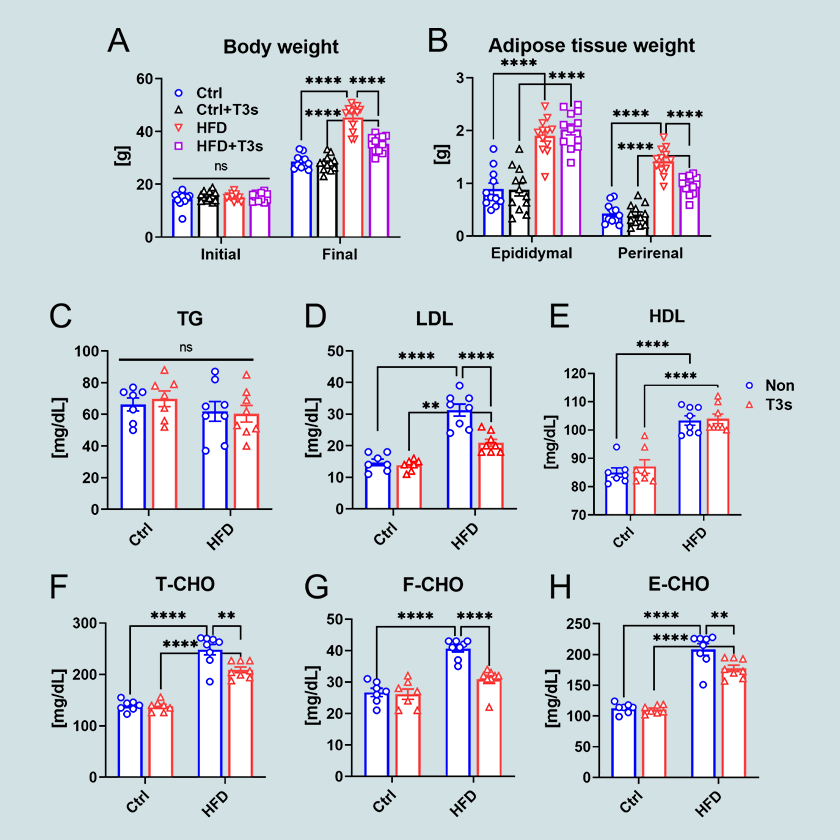
Title:Tocotrienols help prevent obesity and high blood cholesterol levels
Caption:Animal experiments show that tocotrienols (T3s), a subtype of vitamin E, reduce the total weight gained by mice on a high-fat diet. Moreover, T3s significantly lower the blood levels of “bad” cholesterol without affecting “good” cholesterol levels.
Credit:MDPI, Molecules, Volume 27
Usage restrictions:Cannot be used without prior permission
Over the past few decades, obesity has become increasingly common throughout the entire world. Since obesity often causes other diseases, including diabetes and various cardiovascular disorders, it represents an alarming social problem in both developed and developing countries. Although most of us know that a balanced diet and plenty of exercise are the best ways to prevent obesity, having drugs to effectively treat it would still come in handy if necessary.
Unfortunately, there are very few known substances or drugs that can help prevent or treat obesity and its dreaded secondary diseases. One problem is that some of the mechanisms of obesity-induced diseases are unclear. For example, there is some evidence showing that obesity increases oxidative stress (oxidation) in the body. In turn, some scientists suspect that increased oxidation is the reason why obesity paves the way for neurodegenerative disorders like Alzheimer’s disease. Taking this into account, it might be helpful if potential drugs for treating obesity also had strong antioxidant functions.
Against this backdrop, a Japanese research team led by Professor Koji Fukui from Shibaura Institute of Technology (SIT), Japan, set out to determine whether tocotrienols (T3s), a subtype of vitamin E, could be the compounds we are looking for. While T3s have been shown to suppress body weight gain in mice fed with a high-fat diet (HFD), we don’t know much about the underlying mechanisms, or how they do so. To shed some light on this issue, the team conducted various experiments on mice treated with either an HFD, an HFD plus T3s, or a control diet with or without T3s (Ctrl+T3s or Ctrl, respectively).
This study, which was first published online on 28 March 2022, and later in a special issue of MDPI’s Molecules, was co-authored by Dr. Yugo Kato from SIT, Mr. Yoshinori Aoki from Mitsubishi Chemical, and Professor Chikako Kiyose from Kanagawa Institute of Technology.
As expected, being fed an HFD for over 13 weeks caused mice to put on a lot of weight as compared to the control group. In contrast, mice treated with an HFD and T3s had a significantly lower body weight. The researchers found that T3s lowered the accumulation of white adipose tissue around the kidneys and protected the liver against damage from the HFD. Moreover, T3s helped reduce levels of low-density lipoprotein, or “bad cholesterol” in the blood without affecting levels of high-density lipoprotein, or “good cholesterol.” “Overall, our results suggest that a higher intake of tocotrienols from daily foods may be effective to prevent obesity,” remarks Prof. Fukui.
Previous studies have reported that obesity might cause cognitive dysfunction, so the researchers also conducted several experiments to check if T3s could help prevent brain oxidation and reduce the cognitive and behavioral changes caused by an HFD. In general, the researchers found no major differences across behavioral tests between mice treated with an HFD plus T3s and those treated with Ctrl plus T3s. In an open field test, too, there were no significant differences between mice who were treated with an HFD and those treated with HFD plus T3s (both groups displayed reduced activity). However, mice treated with an HFD alone seemed to move much lesser in the center of an open field test chamber; such behavior is generally considered to be related to anxiety or depression. In an attempt to clarify why an HFD had this effect, the team checked the levels of a few biomarkers that represent brain oxidation, and the expression of brain-derived neurotrophic factor, a protein which is crucial for the development of neurons and cognitive function. However, they found no notable differences between the HFD-alone and control groups, which leaves us in the dark about why HFDs influenced mice behavior the way they did.
While some of the effects of T3s on the body remain a mystery, this study surely shed light on the path towards drugs to help combat obesity. In this regard, Prof. Fukui states: “We hope our research stimulates further studies on anti-obesity substances such as tocotrienols and similar compounds. Our ultimate goal is to lower the amount of people suffering from obesity-related illnesses.”
Please keep in mind that even if effective anti-obesity substances are eventually found, a healthier weight always begins with an appropriate diet and enough physical exercise!
shibaura-it.ac.jp


